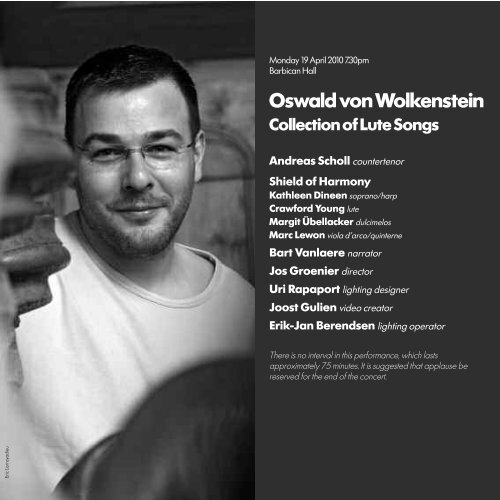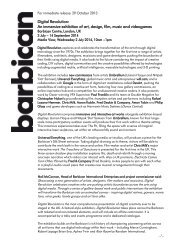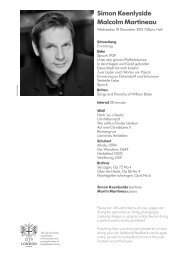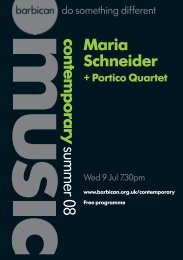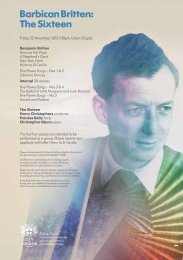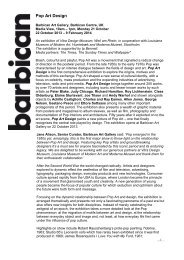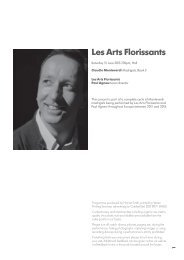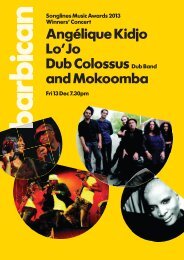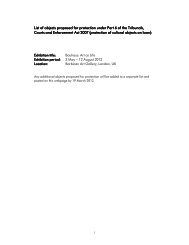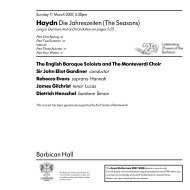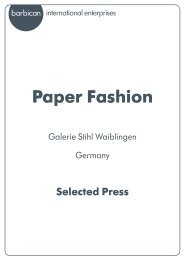Oswald von Wolkenstein - Barbican
Oswald von Wolkenstein - Barbican
Oswald von Wolkenstein - Barbican
Create successful ePaper yourself
Turn your PDF publications into a flip-book with our unique Google optimized e-Paper software.
Eric Larrayadieu<br />
Monday 19 April 2010 7.30pm<br />
<strong>Barbican</strong> Hall<br />
<strong>Oswald</strong> <strong>von</strong> <strong>Wolkenstein</strong><br />
Collection of Lute Songs<br />
Andreas Scholl countertenor<br />
Shield of Harmony<br />
Kathleen Dineen soprano/harp<br />
Crawford Young lute<br />
Margit Übellacker dulcimelos<br />
Marc Lewon viola d’arco/quinterne<br />
Bart Vanlaere narrator<br />
Jos Groenier director<br />
Uri Rapaport lighting designer<br />
Joost Gulien video creator<br />
Erik-Jan Berendsen lighting operator<br />
There is no interval in this performance, which lasts<br />
approximately 75 minutes. It is suggested that applause be<br />
reserved for the end of the concert.
this evening’s programme<br />
<strong>Oswald</strong> <strong>von</strong> <strong>Wolkenstein</strong><br />
(c1376–1445)<br />
Herz, müt, leib, sel<br />
Es fügt sich, I–III<br />
Pierre des Molins (fl 1190–c1220)<br />
Amis tous dous<br />
<strong>Oswald</strong> <strong>von</strong> <strong>Wolkenstein</strong><br />
Grasselick lif<br />
Kom, liebster man<br />
Heinrich <strong>von</strong> Laufenberg<br />
(c1390–1460)<br />
Bis grüsst, maget reine<br />
Anonymous<br />
Parlamento (London, British Library, Add. 29978)<br />
<strong>Oswald</strong> <strong>von</strong> <strong>Wolkenstein</strong><br />
Es fügt sich, IV<br />
Ach, senliches leiden<br />
Der mai mit lieber zal<br />
Der oben swebt<br />
2<br />
Anonymous<br />
Mit ganzem willen wünsch ich dir (Lochamer<br />
Liederbuch)<br />
<strong>Oswald</strong> <strong>von</strong> <strong>Wolkenstein</strong><br />
Durch Barbarei, Arabia<br />
Nu rue mit sorgen<br />
Es fügt sich, VII<br />
Wes mich mein bül<br />
THANKS TO:<br />
Library of Utrecht University<br />
Marco van Egmond<br />
Joost van Gemert<br />
Mirjam Pater<br />
Clara Strijbosch<br />
Tonight’s concert is part of a co-production between the Concertgebouw de<br />
Doelen, Rotterdam, the Cologne Philharmonie, the <strong>Barbican</strong> Centre, London,<br />
and the Philharmonic Hall in Liverpool.<br />
Translation of narrated text: Adrian Brine
<strong>Oswald</strong> <strong>von</strong> <strong>Wolkenstein</strong><br />
The last great medieval romantic<br />
It’s April, the very month in which ‘longen folk to goon on<br />
pilgrimages, And palmeres for to seken straunge strondes To<br />
ferne halwes, couthe in sondry londes’. The season, in other<br />
words, for rising sap and itchy feet. So, what better time to<br />
celebrate a young man who, at the tender age of 10, and<br />
with nothing in his pocket but three cents and a piece of<br />
bread, set off to wander in the wide world. ‘To Prussia,<br />
Lithuania, Tartary, Turkey over the sea, to France, Lombardy,<br />
Spain’ and beyond, to be precise, ‘ searching for love’, and<br />
eventually working in the service of King Rupert, Duke<br />
Friedrich IV of Austria, and King Sigismund of Hungary.<br />
<strong>Oswald</strong> <strong>von</strong> <strong>Wolkenstein</strong>, one-eyed, and looking for all the<br />
world like a latter-day Wotan, has been described by one<br />
commentator as ‘an articulate, earthy, pious, lusty,<br />
sometimes violent knight-entertainer’. For, everywhere he<br />
went, <strong>Oswald</strong> kept a keen ear open to the local musicmaking,<br />
thieving melodies like a magpie, and following the<br />
conventions of late-Gothic courtly love. He moaned,<br />
groaned and celebrated his lot as one of the last knightly<br />
poet-musicians of South Germany. The second song we’ll<br />
hear this evening, ‘Es fügt sich’ (‘It happened’), tells of<br />
<strong>Oswald</strong>’s travels, and is unashamedly autobiographical.<br />
It’s so long – all of 12 minutes – that Andreas Scholl and<br />
his musicians plan to use it as a sort of rondo-refrain – a<br />
programme note<br />
thread that winds its way through the evening. It’ll function<br />
as a type of leitmotif, tipped off by the plucking of a harp,<br />
and with its three stanzas cumulatively telling the tale of<br />
<strong>Oswald</strong>’s wanderings.<br />
<strong>Oswald</strong> was born around 1376, at a time of widespread<br />
upheaval, and less than 30 years after the devastations of<br />
the Black Death. As <strong>Oswald</strong> came into the world, in the<br />
South Tyrolean alpine town of Kiens, Wycliffe’s translation<br />
of the Bible into English appeared, and Piers Plowman<br />
had just been written by William Langland. And, just as the<br />
10-year-old boy set off on his travels as a diminutive squire<br />
of a knight-errant, Chaucer was completing his Canterbury<br />
Tales. In 1408, <strong>Oswald</strong> prepared for a pilgrimage of his<br />
own to the Holy Land, and grew the long beard that<br />
marked out the pilgrims. It is thought that his ditty ‘Der oben<br />
swebt’ (‘He is the one who hovers above’), hymning Divine<br />
omnipresence and omniscience, and ending with a chantlike<br />
prayer to the Virgin Mary, could date from this period.<br />
Before this outburst of sacred ardour, <strong>Oswald</strong> had written<br />
plenty of rather more profane poems for his beloved Anna<br />
Hausmann, a married woman whose heart he continued<br />
to hymn even after his marriage in 1417 to Margarete <strong>von</strong><br />
Schwangau – by whom he had no fewer than seven children.<br />
The sweet dawn dialogue song, ‘Nu rue mit sorgen’ (‘Now<br />
3
programme note<br />
rest from your cares’), one of <strong>Oswald</strong>’s most beautiful<br />
poems, is a Romeo and Juliet vignette in which the sad<br />
syllables of the woman seem to be trying to slow the pace of<br />
her lover’s impending departure.<br />
Two years before <strong>Oswald</strong>’s marriage, when Henry V was<br />
galloping once more unto the breach at Agincourt, our poet<br />
found himself in the entourage of Friedrich IV, Duke of<br />
Austria, at the Council of Konstanz. These councils were long,<br />
drawn-out affairs: some delegates would arrive in March,<br />
others turn up in mid-May, so volatile were travelling<br />
conditions and the political climate of the time. Andreas<br />
Scholl likes to imagine that ‘at night, there would be drinking,<br />
and musicians and poets like <strong>Oswald</strong> would present their<br />
new compositions, commenting on politics and life. His<br />
friends must have loved to hear of his exploits and<br />
escapades, his fantasies and his fights.’ While kings and<br />
princes, diplomats and dukes lingered long, these were<br />
creative times for <strong>Oswald</strong> <strong>von</strong> <strong>Wolkenstein</strong>.<br />
Soon after Konstanz, <strong>Oswald</strong> found himself sent as a<br />
diplomat to the service of Sigismund, King of Hungary. He<br />
didn’t much like it, on the evidence of his complaints and<br />
curses in the stomping ‘Wes mich mein bül’ (‘Whatever gifts’).<br />
4<br />
Absence from his lady, noisy children and even bed-bugs<br />
were added to the family disputes, peasant uprisings and<br />
dislocation of principalities and powers that were the<br />
constant companions of <strong>Oswald</strong>’s life. No wonder that he<br />
fled, in his few private moments, to poetic refuge, and to the<br />
comforts and containment of chivalric literary convention.<br />
For <strong>Oswald</strong> used music primarily to communicate his poetry.<br />
He would borrow from sources such as the graceful melodies<br />
and suave harmonies of the ballate and madrigals of the<br />
highly fashionable Francesco Landini (c1325–97), from<br />
French trouvère songs, and from the more raw and robust<br />
melodies of his German predecessors. As Scholl says, ‘He<br />
was no mere troubadour: he performed for his equals, for<br />
nobles; and wherever he went, he hooked up with courtly<br />
musicians. He brought back their melodies, and often sold<br />
them as his own – after all, there was no great risk of being<br />
exposed in the Tyrol, and ordinary people really didn’t travel<br />
very far in those days.’<br />
No more than an amateur polyphonist, <strong>Oswald</strong> delighted in<br />
borrowing one melody with which to offset another. His<br />
‘contrafacting’ can be heard in songs such as ‘Ach, senliches<br />
leiden’ (‘Alas, heartfelt pain’) and ‘Kom, liebster man!’
(‘Come, dearest man’). Scholl, trained as an electro-acoustic<br />
musician in his student days, once amused himself by making<br />
a multi-track setting of one of <strong>Oswald</strong>’s ditties: as pop songs,<br />
some of them work rather well. Like today’s itinerant<br />
crooners, <strong>Oswald</strong> had a high opinion of his own worth – so<br />
much so that, in the peaceful, if short-lived, lull brought<br />
about by the Alliance of Bingen in 1424, he commissioned<br />
the Kloster Neustift, near Brixen (with whose Augustinian<br />
monks he had stayed in 1410), to create a sumptuous<br />
parchment of his songs. The monastery was at that time a<br />
popular resting-place for pilgrims, and a significant force in<br />
the cultural and intellectual life of Europe. Even today, it’s a<br />
lively centre for theological courses and seminars; its Gothic<br />
cloister, basilica and exquisite white and gold library may be<br />
visited, and the monks’ renowned Sylvanerschnaps and<br />
herb-tea tasted and purchased.<br />
After King Sigismund (to whom <strong>Oswald</strong> had been unfailingly<br />
loyal) was crowned Holy Roman Emperor in 1433, <strong>Oswald</strong>’s<br />
life quietened down somewhat. In August 1445, when he was<br />
visiting the spa town of Meran (now Merano, surrounded by<br />
mountains, and cherished for its mild climate by none other<br />
than Franz Kafka and Ezra Pound), <strong>Oswald</strong> died of<br />
heatstroke. He was buried near the font at his beloved<br />
programme note<br />
Kloster Neustift: his grave was rediscovered as recently as<br />
1973.<br />
<strong>Oswald</strong> <strong>von</strong> <strong>Wolkenstein</strong>, poised in time between the art of<br />
the knightly Minnesangers and the petit-bourgeois craft of<br />
the Meistersingers, remained true to the vanishing traditions<br />
of medieval romanticism in his life and in his art. The<br />
American musicologist Paul Henry Lang has saluted him as<br />
‘the last great representative of the medieval lyric art of his<br />
class’. And Andreas Scholl and his musicians are keen to<br />
kindle our imaginations to inhabit his world. ‘I want this<br />
concert to be a time-machine’, says Scholl, ‘to enable us to<br />
have a glimpse of a brutally honest figure – an artist not<br />
ashamed to retain many embarrassing facts about himself –<br />
unlike our own celebrities! He wanted – and we want – to<br />
convey, above all, his honesty. This man speaks to me<br />
through his music. And I want to use modern technology as a<br />
means of expression to illuminate his character still further. It<br />
might be controversial – but then he was too! And I’d like the<br />
audience to examine themselves, too, and think about ways<br />
like this in which we can perhaps ensure that our own<br />
conventional rituals of concert-giving and music-making will<br />
not alienate future generations …’<br />
Programme note © Hilary Finch<br />
5
text<br />
<strong>Oswald</strong> <strong>von</strong> <strong>Wolkenstein</strong><br />
Herz, müt, leib, sel<br />
Herz, müt, leib, sel und was ich han,<br />
Das freut ain lieplich angesicht,<br />
Dem sol ich wesen undertan,<br />
Zu dienen stetiklich gericht.<br />
Frau, du solt unvergessen sein<br />
In meinem herzen ewikleich,<br />
Und wer das ouch der wille dein,<br />
So ward nie kaiser mein geleich.<br />
Ich wolt, du wesst an als gever<br />
Mein freuntschaft halb, die ich dir trag;<br />
Zwar du erfürst vil lieber mer<br />
Von dir zu mir an alle frag.<br />
Wie serr ich bin, so nahet mir<br />
Inbrünstiklich dein stolzer leib,<br />
Senlich darnach stet mein begier;<br />
Du freust mich zwar für alle weib.<br />
Es fügt sich<br />
I<br />
Es fügt sich, do ich was <strong>von</strong> zehen jaren alt,<br />
Ich wolt besehen, wie die werlt wer gestalt.<br />
Mit ellend, armuet mangen winkel, haiss und kalt,<br />
Hab ich gebaut bei cristen, Kriechen, haiden.<br />
Drei pfenning in dem peutel und ain stücklin brot,<br />
Das was <strong>von</strong> haim mein zerung, do ich loff in not.<br />
Von fremden freunden so hab ich manchen tropfen rot<br />
Gelassen seider, das ich wand verschaiden.<br />
Ich loff ze füss mit swerer büss, bis das mir starb<br />
Mein vatter, zwar wol vierzen jar nie ross erwarb,<br />
Wann aines roupt, stal ich halbs zu mal mit valber varb,<br />
Und des geleich schied ich da <strong>von</strong> mit laide.<br />
Zwar renner, koch so was ich doch und marstaller,<br />
Auch an dem rüder zoch ich zu mir, das was swer,<br />
6<br />
Heart, mind, body, soul<br />
Heart, mind, body, soul and whatever I have,<br />
are all infused with joy by a pretty face,<br />
to whom I will be dedicated,<br />
constantly ready to do service.<br />
Lady, you will be in my heart<br />
forever, indelibly,<br />
and if you were to reciprocate the sentiment,<br />
an emperor was never as happy as I.<br />
I wished you would be aware, without any prejudice,<br />
of the affection that I feel for you, at least half of it.<br />
Then you would learn many pleasant things<br />
about you and me, without any doubt.<br />
How far away I might be, your wonderful body<br />
comes to me, intoxicating me.<br />
Full of longing I desire your body,<br />
you make me happier than all other women.<br />
It happened<br />
It happened, when I was 10 years old,<br />
that I wanted to see what the world was.<br />
I have been in warm and cold places, in misery and poverty,<br />
with Christians, Greek-Orthodox and heathens.<br />
Then, I had three cents in my pocket and a piece of bread<br />
from home to keep me alive, when I headed out into the<br />
big world.<br />
Because of certain ‘friends’ I have shed so many drops<br />
of blood that I thought I must die.<br />
I travelled by foot, heavily burdened, until the day my<br />
father died.<br />
I was 14 years old and still had no horse,<br />
except for one I stole, and a stolen mule, light-coloured,<br />
but both were unfortunately stolen from me.<br />
I was messenger runner, cook and groom,<br />
also an oarsman – that was hard work –
In Kandia und anderswa, ouch wider har,<br />
Vil mancher kittel was mein bestes klaide.<br />
II<br />
Gen Preussen, Littuan, Tartarei, Türkei, über mer,<br />
Gen Frankreich, Lampart, Ispanien, mit zwaien künges her<br />
Traib mich die minn auf meines aigen geldes wer:<br />
Ruprecht, Sigmund, baid mit des adlers streiffen.<br />
Franzoisch, mörisch, katlonisch und kastilian,<br />
Teutsch, latein, windisch, lampertisch, reuschisch und roman,<br />
Die zehen sprach hab ich gebraucht, wenn mir zerran;<br />
Auch kund ich fidlen, trummen, paucken, pfeiffen.<br />
Ich hab umbfarn insel und arn, gar manig land,<br />
Auff scheffen gros, der ich genos <strong>von</strong> sturmes band,<br />
Des hoch und nider meres gelider vast berant;<br />
Die swarze see lert mich ain vas begreiffen,<br />
Do mir zerbrach mit ungemach mein wargatin,<br />
Ain koufman was ich, doch genas ich und kam hin,<br />
Ich und ain Reuss; in dem gestreuss houbgüt, gewin,<br />
Das sücht den grund und swam ich zu dem reiffen.<br />
III<br />
Ain künigin <strong>von</strong> Arragon, was schön und zart,<br />
Da für ich kniet, zu willen raicht ich ir den bart,<br />
Mit hendlin weiss bant si darein ain ringlin zart<br />
Lieplich und sprach: ‘non maiplus dis ligaides’.<br />
Von iren handen ward ich in die oren mein<br />
Gestochen durch mit ainem messin nädelein,<br />
Nach ir gewonheit sloss si mir zwen ring dorein,<br />
Die trüg ich lang, und nennt man si raicades.<br />
Ich sücht ze stund künig Sigmund, wo ich in vand,<br />
Den mund er spreutzt und macht ain kreutz, do er mich kant,<br />
Der rüfft mir schier: ‘du zaigest mir hie disen tant’,<br />
Freuntlich mich fragt: ‘tün dir die ring nicht laides?’<br />
Weib und ouch man mich schauten an mit lachen so;<br />
Neun personier küngklicher zier, die waren do<br />
Ze Pärpian, ir babst <strong>von</strong> Lun, genant Petro,<br />
Der Römisch künig der zehent und die <strong>von</strong> Praides.<br />
near Crete and elsewhere, and later back again.<br />
many different types of coats were my ‘finery’.<br />
text<br />
To Prussia, Lithuania, Tartary, Turkey over the sea,<br />
to France, Lombardy, Spain, searching for love,<br />
at my own expense, marching with the forces of two kings,<br />
Ruprecht and Sigismund, under the herald of the eagle.<br />
French, Moorish, Catalan, Castilian, German, Latin,<br />
Slovenian, Italian, Russian, Romansch, these 10 languages<br />
I used whenever I had to.<br />
Plus, I could play fiddle, trumpet, drum and pipe.<br />
I sailed past islands and peninsulas and many countries<br />
on big ships, which guarded me from the dangers of storms.<br />
I sailed the high and low seas.<br />
The Black Sea taught me a few things<br />
when my ship sank in my bad fortune.<br />
I was a merchant then, and survived, me and a Russian.<br />
I swam to shore in the raging sea<br />
while our goods and profits sank to the bottom.<br />
Before the Queen of Aragon – so beautiful and tender –<br />
I knelt down and raised my face to her,<br />
with white hands she hung a precious ring<br />
on my beard saying, Never remove this!<br />
She herself pierced my ears with a small brass needle,<br />
and affixed two earrings,<br />
according to Aragonese custom<br />
called raicades, which I wore for a long time.<br />
Following this I met King Sigismund, whom I found staring<br />
with open mouth, crossing himself when he recognised me,<br />
and immediately called, What have you got?<br />
then asked in a friendly way,<br />
Doesn’t it hurt to wear those rings?<br />
Both women and men looked at me, laughing,<br />
including nine royal persons from Perpignan,<br />
their Pope Pedro de Luna, the Roman king and Lady<br />
of Prades.<br />
Please turn page quietly<br />
7
text<br />
Grasselick lif<br />
I<br />
Grasselick lif, war hef ick dick verloren<br />
All dise lange, sütten summertit?<br />
Dat gi mi komt tu vorn,<br />
So left min hert in grot jo lit.<br />
II<br />
Geilicken fro, all telich sunder truren<br />
Tüt jo frowen lan einig minen lif!<br />
Dat gschol ick nit verluren,<br />
Mit willen gschin dein einig wif.<br />
III<br />
Freuntlicker gschat, dat slot müt gschin verbunden<br />
Und so keiserlick wol verrigelt sir.<br />
Erst hef ick freude funden,<br />
Und welt min hert kain andern mier.<br />
Kom, liebster man!<br />
I<br />
‘Kom, liebster man!<br />
Meins leibs ich dir wol gan<br />
An abelan.<br />
Kom, traut gesell,<br />
Glücklich fleuch ungevell!<br />
Kom, höchster schatz, zu tratz<br />
Der falschen zungen latz!<br />
Kom schier, meins herzen laid vertreib,<br />
Und tröst mich vil armes weib!<br />
Dein mänlich leib reicht sinn und müt<br />
An mir für aller welde güt.’<br />
II<br />
Dein wort, gepär<br />
Ringt all mein swer,<br />
Frau, lieber mer,<br />
Seid mein begerd<br />
Ain stolz weib, junck, hoch und werd,<br />
Die mir das herz an smerz<br />
Verjüngt mit liebem scherz<br />
8<br />
You horrible angel<br />
‘You horrible angel, where did you hide so often<br />
this whole long beautiful summer?’<br />
‘That I have found you<br />
causes great joy in my heart.’<br />
‘Playfully, happily, free of all sadness,<br />
let me be the only one to give you joy!’<br />
‘I don’t say otherwise,<br />
I only want to be your woman.’<br />
‘Dear treasure, let the lock be closed<br />
and bolted as tight as ever.’<br />
‘Now I know the joy,<br />
my heart never wants another.’<br />
Come, dearest man<br />
Come, dearest man,<br />
I gladly give myself to you<br />
forever,<br />
come dearest companion,<br />
leave misfortune behind,<br />
come dearest treasure,<br />
ignore the mouths of gossips,<br />
come quickly, drive out the sadness from my heart<br />
and console poor me!<br />
Your manliness revives my spirit and thoughts,<br />
more than anything else in the world.<br />
Your words and gestures<br />
alleviate all my cares,<br />
woman, and even better,<br />
a proud lady,<br />
young, noble and honorable,<br />
wants me, who rejuvenates my heart,<br />
eliminating pain,
Gar wunniklichen manigvalt.<br />
Ir minniklich schön gestalt<br />
Macht mich nicht alt, und bin ergetzt,<br />
Von klaren öglin mich benetzt.<br />
III<br />
‘Schaiden mich nöt,<br />
Dein schaiden mich ertöt,<br />
Mein öglin röt,<br />
Und bin verzuckt,<br />
Der sinnen blösslich entruckt.<br />
Mein weiplich zucht, die frucht<br />
Fleusst senlich ir genucht.<br />
Ob du mir kurzlich nicht enschreibst<br />
Und selb lang <strong>von</strong> mir beleibst,<br />
Wie du das treibst,<br />
So fürcht ich ser,<br />
Oder ich gesech dich nimmer mer.’<br />
Heinrich <strong>von</strong> Laufenberg<br />
Bis grüsst, maget reine<br />
Bis grüsst, maget reine,<br />
Küngin bist alleine,<br />
Aller welt gemeine,<br />
Erbermd hat sie nicht kleine,<br />
Die ich nu meine;<br />
Leben kan sie bringen,<br />
Süsskeit us ir dringen,<br />
Der ich hie wil singen,<br />
Und hoffnung unsern dingen,<br />
Bis grüsst, hilf uns gelingen.<br />
Zu dir schrient wir mit begir,<br />
Ellend nu hilf uns schir,<br />
Sun Even uns nicht verlir.<br />
Zu dir süfzent wir, nicht enbir,<br />
Weinend und ouch greinend;<br />
In disz trehental schouw uberal,<br />
Und an yal wend gebresten alle mal.<br />
with love talk in wonderful fashion.<br />
Her elegant, lovely form<br />
makes me young, and refreshes me<br />
with clear sweet eyes.<br />
Parting is painful,<br />
your leaving kills me,<br />
making my eyes red,<br />
I am upset,<br />
stripped of my senses.<br />
My feminine way, the fruit of it all,<br />
pales because of this longing.<br />
If you do not write to me soon,<br />
and stay away,<br />
as you are doing,<br />
then I greatly fear<br />
that I will never see you again.<br />
Hail, pure Virgin<br />
Hail pure Virgin,<br />
you alone are the Queen<br />
of the whole world,<br />
no little compassion has she,<br />
upon her I concentrate my thoughts,<br />
she can give life,<br />
sweetness oozes from her<br />
which I want to sing of here,<br />
as well as hope for our affairs<br />
welcome, help us to thrive.<br />
We fervently raise our voice to you,<br />
in supplication, be with us in times of need,<br />
do not forsake us children of Eve.<br />
We sigh to you, – be with us –<br />
weeping and also whimpering<br />
in this Valley of Tears, gaze all around<br />
and – without boundaries – banish sorrow fully.<br />
text<br />
Please turn page quietly<br />
9
text<br />
Eya! darumb unser fursprechin kumb,<br />
Versprich uns umb und umb;<br />
Die din diener wellent sin,<br />
Erbermd teil mit in,<br />
Zartes schoenes megedin;<br />
Und din augen vin<br />
Dahin zu uns har<br />
Ker und nim war diser kristenlichen schar.<br />
Und Jesum alzit benedictum,<br />
Frucht gnucht dins libes zucht,<br />
Gib ouch ze zuflucht uns allen armen.<br />
Nach disem ellend ruch dich erbarmen,<br />
Zeig uns bei dir barmen.<br />
O megdliche kron gib uns dich ze lon<br />
O Salomons tron, wol gebuwen schon,<br />
O selden wunn, dich bkleit der sunn,<br />
O süsser brunn Maria!<br />
<strong>Oswald</strong> <strong>von</strong> <strong>Wolkenstein</strong><br />
Es fügt sich<br />
IV<br />
Mein tummes leben wolt ich verkeren, das ist war,<br />
Und ward ein halber beghart wol zwai ganze jar;<br />
Mit andacht was der anfangk sicherlichen zwar,<br />
Hett mir die minn das ende nicht erstöret.<br />
Die weil ich rait und süchet ritterliche spil<br />
Und dient zu willen ainer frauen, des ich hil,<br />
Die wolt mein nie genaden ainer nussen vil,<br />
Bis das ain kutten meinen leib bedoret.<br />
Vil manig ding mir do gar ring zu handen ging,<br />
Do mich die kappen mit dem lappen umbefing.<br />
Zwar vor und leit mir nie kain meit so wol verhing,<br />
Die mein wort freuntlich gen ir gehöret.<br />
Mit kurzer schnür die andacht für zum gibel aus,<br />
Do ich die kutt <strong>von</strong> mir do schutt in nebel rauss,<br />
Seid hat mein leib mit leid vortreib vil mangen strauss<br />
Gelitten, und ist halb mein freud erfröret.<br />
10<br />
Just so! thus come, our protectress,<br />
defend us everywhere,<br />
your servants we would like<br />
to be, distribute your mercy to these,<br />
tender beautiful maiden<br />
and turn your bright gaze<br />
upon us,<br />
and accept this Christian flock.<br />
And give Jesus, perpetual blessing,<br />
fruit of abundance, child of your flesh,<br />
to us weaklings as refuge.<br />
After this misery have pity,<br />
show us your compassion.<br />
O crown of virginity, give us yourself as reward,<br />
O throne of Solomon, so beautifully made,<br />
O, O bliss of happiness, that surrounds you the sun,<br />
O sweet fountain of Mary.<br />
It happened<br />
I wanted to turn over a new leaf, that’s true,<br />
and I was half a beggar for two full years;<br />
at the beginning pious to be sure,<br />
at the end foiled in my piety by love.<br />
While I rode and sought knightly sport,<br />
and served a lady, without further comment,<br />
she granted me not a nut’s worth of favour!<br />
until a monk’s habit bedeckt my body.<br />
Many things then came easily,<br />
when I wore the monk’s hood,<br />
in truth, never before or after were girls so friendly,<br />
as they listened to my chatter.<br />
My devotions quickly went up the chimney,<br />
when I took off the cowl amid the smoke,<br />
since then there have been many love problems,<br />
and all my joy is half frozen.
Ach, senliches leiden<br />
I<br />
Ach senliches leiden,<br />
Meiden, neiden, schaiden, das tüt we,<br />
Besser wer versunken in dem see.<br />
Zart minnikliches weib,<br />
Dein leib mich schreibt und treibt gen Josophat.<br />
Herz, müt, sin, gedanck, ist worden mat.<br />
Es schaidt der tod,<br />
Ob mir dein gnad nicht helfen wil<br />
Auss grosser not;<br />
Mein angst ich dir verhil.<br />
Dein mündlin rot<br />
Hat mir so schier mein gier erwecket vil,<br />
Des wart ich genaden an dem zil.<br />
II<br />
Mein herz in iamer vicht,<br />
Erbricht, bericht und slicht den kummer jo!<br />
Frau, schidlicher freuntschafft wart ich so,<br />
Recht als der delephin,<br />
Wenn in der sin fürt hin zu wages grund<br />
Vor dem sturm, und darnach wirt enzunt<br />
Von sunnen glast,<br />
Die im erkückt all sein gemüt.<br />
Herzlieb, halt vast<br />
Durch all dein weiplich güt!<br />
Lass deinen gast<br />
Nicht sterben, serben, werben in unfrüt!<br />
In ellenden pein ich tob und wüt.<br />
III<br />
Mein houbt, das ist beklait<br />
Mit waffen, slauffen, straffen die natur,<br />
Das mich twingt ain stund für tausent ur.<br />
Wenn ich mein laid betracht<br />
Die nacht, so wacht mein macht mit klainer krafft,<br />
Und ich freuden ganz wird sigehaft.<br />
Mich niemand tröst<br />
Und ist mein leiden sicher gross,<br />
Mein herz, das wirt geröscht<br />
Alas, heartfelt pain<br />
Alas, heartfelt pain,<br />
shunning, fighting, separation, all that hurts,<br />
it would be better to drown in the deep!<br />
Graceful, delightful lady,<br />
you banish me, chasing me to Josaphat.<br />
My heart, mind, spirit and reason have lost their strength.<br />
Death will mean the end of it all<br />
if your mercy will not<br />
help me out of my deep misery.<br />
I hide my anguish from you.<br />
Your red lips<br />
have enflamed my desire, so that I insist, finally,<br />
to be granted an audience.<br />
My heart is struggling,<br />
filled with misery, and is breaking.<br />
Please soothe and lessen my cares.<br />
Lady, I am waiting for your kindness,<br />
like the dolphin, when its instinct guides it down<br />
to the bottom of the sea during a storm,<br />
until it is attracted by<br />
the brilliance of the sun above<br />
which refreshes its heart completely.<br />
Dearest, be steadfast, in the name of all your female virtue!<br />
Do not let your distant one die,<br />
suffer and love in vain.<br />
I am out of my mind, crazy because of the pain of being<br />
apart.<br />
My head is enclosed with laments,<br />
dullness and self-conflict,<br />
one hour thus feels like a thousand.<br />
When I think about my dilemma<br />
at night, I lie awake, weak,<br />
and destroy any joy I might have.<br />
No one consoles me,<br />
which makes my suffering truly bitter.<br />
My heart is burned<br />
text<br />
Please turn page quietly<br />
11
text<br />
Mit manchem seufften stoss.<br />
Ach we, wann wirt erlöst<br />
mein trauren? tauren, lauren negt und pösst,<br />
Da mit ich der sinn wird gar emblösst.<br />
Der mai mit lieber zal<br />
Der mai mit lieber zal die erd bedecket überal,<br />
Pühel, eben, berg und tal,<br />
Auss süssen voglin schal erklingen,<br />
Singen hohen hal galander, lerchen,<br />
droschel, die nachtigal.<br />
Der gauch fleucht hinden hin<br />
Nach zu grossem ungemach klainen vogelin gogelreich.<br />
Höret, wie er sprach, cu cu, cu cu, cu cu,<br />
Den zins gib mir, den wil ich han <strong>von</strong> dir,<br />
Der hunger macht lunger mir den magen schir!<br />
Ach ellend! nu wellent sol ich?<br />
So sprach das klaine vich.<br />
Küngel, zeisel, mais, lerch, nu komen wir singen:<br />
Oci und tu ich tu ich tu ich tu ich,<br />
Oci oci oci oci oci oci,<br />
Fi fideli fideli fideli fi,<br />
Ci cieriri ci ci cieriri,<br />
Ci ri ciwigk cidiwigk fici fici.<br />
So sang der gauch neur: kawa wa cu cu.<br />
Raco, so sprach der rab, zwar ich sing ouch wol<br />
Vol müss ich sein, das singen mein<br />
Scheub ein! herein! vol sein!<br />
Liri liri liri liri liri liri lon,<br />
So sang die lerch, so sang die lerch, so sang die lerch.<br />
Ich sing hel ain droschelin, ich sing hel ain droschelin,<br />
Ich sing hel ain droschelin, das in dem wald erklinget.<br />
Ir lierent, zierent gracket und wacket hin und her<br />
Recht als unser pfarrer, zidiwick zidiwick zidiwick,<br />
Zificigo zificigo zificigo, nachtigall,<br />
Dieselb mit irem gesangk behüb den gral.<br />
12<br />
by many deep sighs.<br />
Oh, when will sadness depart from me?<br />
Waiting and hoping plague and torture me,<br />
so that I am losing my mind.<br />
The month of May<br />
The month of May envelops the entire land,<br />
the hills, the plain, mountains and valleys,<br />
delightful birds in a concert make merry and sing<br />
with loud voices, the tufted lark, the field lark,<br />
the thrush and the nightingale.<br />
The cuckoo follows them from behind,<br />
he is a bad pest to these cheerful little birds.<br />
Listen to what he is saying, cu cu, cu cu, cu cu,<br />
give me a toll, I demand it from you,<br />
hunger makes my stomach greedy!<br />
Oh misery, where should I turn now?<br />
said the little creature.<br />
Wren, siskin, titmouse, lark, come now, let us sing:<br />
oci and do I, do I, do I, do I,<br />
oci, oci, oci, oci, oci, oci,<br />
fi fideli, fideli, fideli fi,<br />
ci, cieriri, ci, ci, cieriri,<br />
ci ri, civigk, cidivigk, fici, fici!<br />
But the cuckoo only sang, kawa wa, cu cu.<br />
Raco, sings the raven, truly, my voice is also beautiful<br />
but my stomach must be filled, my song goes:<br />
Shove it in, inside, fill it up,<br />
liri liri liri liri liri liri lon,<br />
is the song of the lark, is the song of the lark,is the song of<br />
the lark.<br />
The thrush announces, My song is so loud! My song is<br />
so loud!<br />
My song is so loud that it echoes in the forest!<br />
Hey birds, you twitter, jubilate, croak and crow,<br />
here and there, just like our priest. Zidiwick zidiwick zidiwick,<br />
zificigo zificigo zificigo, the nightingale<br />
could win the Grail with her singing.
Upchahi, so sprach das ful, lat uns auch dar zu.<br />
Frue vert die kue der esel lue: her sak auff meinem nack.<br />
Rigo rigo rigo rigo rigo rigo kum.<br />
So rufft die mul, so rufft die mul, so rufft die mul.<br />
Ker ab, so sprach die mulnerin heb auff schrey die pawrin,<br />
Nu trag hin mein eselein da da prufta Ja nü leir!<br />
Nicht veir bis dir d’geir dye hawt abziehen wirt bey dem<br />
veyer!<br />
Wol auff wol auff wol auff wol auff saylon pint auff schintt<br />
dich wolpurg!<br />
Rugel dich gut waydman mit iagen paissn rogken in den tan!<br />
Der oben swebt<br />
I<br />
Der oben swebt und niden hebt,<br />
Der vor und hinden, neben strebt<br />
Und ewig lebt, ie was an anefange,<br />
Der alt, der jung, und der <strong>von</strong> sprung<br />
Trilitzsch gefasst in ainlitz zung<br />
An misshellung mit unbegriffner strange,<br />
Der strenklich starb und was nicht tod,<br />
Der keuschlich ward emphangen und an alle not<br />
Geboren rot, weiss durch ain junckfrau schöne,<br />
Der manig wunder hat gestifft,<br />
Die hell erbrach, den tiefel dorin ser vergifft,<br />
Getült, geschifft all wurz durch stammes tröne.<br />
text<br />
Upchachi, said the colt, I want to join in!<br />
The cow is up early, the donkey cried: Come here, load, onto<br />
my back!<br />
Rigo rigo rigo rigo rigo rigo, come!<br />
like this the mill sounded, like this the mill sounded, like this<br />
the mill sounded.<br />
Beat it! shouted the miller’s wife. Lift! called the farmer’s wife,<br />
Carry it over there, my little donkey! There, there, just snort<br />
your heehaw!<br />
Don’t be lazy, make some music, until the vulture by the lake<br />
strips your skin!<br />
Get up, get up, get up, stretch string, rope-maker, Curse you,<br />
Walburg!<br />
Hurry up, dear hunter, with hunting, drinking, bird-catching<br />
in the woods!<br />
He is the one who hovers above<br />
He is the one who hovers above and holds steady below,<br />
who busily works in front, behind and at the side,<br />
who lives forever, since eternity without beginning.<br />
He – both old and young – is the one who was from the<br />
origin<br />
enfolded in one single word three times,<br />
without a wrong note and in incomprehensible combination,<br />
He is the one who died tortuously, but was not dead.<br />
He was born chastely and without causing pain,<br />
being both white and red, by a beautiful virgin.<br />
He is the one who created so many miracles,<br />
who tore open the gates of Hell and poisoned the devil.<br />
He is the one who makes the twigs and branches grow out<br />
of the roots by means of the sap within.<br />
Please turn page quietly<br />
13
text<br />
II<br />
Dem offen sein all herzen schrein,<br />
Grob, tadelhäfftig, swach, güt, vein,<br />
Das er dorin sicht allerlai gedenke,<br />
Dem tün und lan ist undertan,<br />
Die himel steren, sunn, der man,<br />
Der erden plan, mensch, tier, all wasser rencke,<br />
Auss dem all kunst geflossen ist,<br />
Von dem, der aller creatur durch spähen list<br />
Zu jeder frist ir zierhait würckt, schon eusset,<br />
Dem alle tier, zam und ouch wild,<br />
Hie danckber sein, das er den samen hat gebildt unversert<br />
Der narung milt, gar waideleich vergreusset.<br />
III<br />
Der himel, erd gar unversert<br />
Hat undersetzt an grundes herd,<br />
Das wasser kert dorin durch fremde rünste –<br />
Der wunder zal vil tusent mal<br />
Wer mer ze singen überal<br />
Mit reichem schal, so hindern mich die künste –<br />
Der mir die sel klar geben hat,<br />
Leib, er und güt, vernufft und kristenliche wat:<br />
Der geb mir rat, das ich im also dancke,<br />
Da mit ich all mein veind verpaw<br />
Baid hie und dort, das mich ir kainer nicht verhau.<br />
O keuschlich frau, dein hilf mir dorzu schrancke!<br />
Durch Barbarei, Arabia<br />
I<br />
Durch Barbarei, Arabia,<br />
Durch Hermani in Persia,<br />
Durch Tartari in Suria,<br />
Durch Romani in Türggia,<br />
Ibernia,<br />
Der sprüng han ich vergessen.<br />
Durch Reussen, Preussen, Eiffenlant,<br />
Gen Litto, Liffen, übern strant,<br />
Gen Tennmarckh, Sweden, in Prabant,<br />
Durch Flandern, Franckreich, Engelant<br />
14<br />
He is the one for whom all heart-shrines are open,<br />
whether they are rough, filled with shortcomings,<br />
poor, noble or beautiful, so that He can discover in them<br />
many thoughts.<br />
He is the one to whom all deeds and actions are subject,<br />
the heavenly stars, the sun, the moon,<br />
the earthly sphere, people, animals and all bodies of water.<br />
He is the one from whom all knowledge has emanated.<br />
He is the one who prudently grants all creatures<br />
beautiful grace and makes it visible pleasantly.<br />
He is the one to whom all animals, domestic and also wild,<br />
are thankful for having created the seed<br />
for the rich nourishment so lavishly dispersed.<br />
He is the one who has founded heaven and earth<br />
flawlessly and without needing foundation,<br />
and who makes the water flow through strange channels.<br />
I could sing about these miraculous things<br />
a thousand times and everywhere with a loud voice,<br />
but my art is not good enough.<br />
He is the one who granted me a pure soul,<br />
a body, honour, property, reason, and a Christian faith.<br />
May He give me advice, allowing me to thank Him properly<br />
and to fend off all my enemies,<br />
both here and there, so that no one can hurt me.<br />
Oh, chaste Lady, lend me your assistance in this effort.<br />
Travelling through Morocco, Arabia,<br />
through Armenia to Persia,<br />
through the Tartar lands to Syria,<br />
via Byzantium to Turkey,<br />
then Georgia,<br />
I no longer know how to travel.<br />
Through Russia, Prussia, Estonia,<br />
Lithuania, Li<strong>von</strong>ia, and along the coast<br />
towards Denmark, Sweden, on to Brabant,<br />
through Flanders, France, England
Und Schottenland<br />
Hab ich lang nicht gemessen,<br />
Durch Arragon, Kastilie,<br />
Granaten und Afferen,<br />
Aufs Portugal, Ispanie<br />
Bis gen dem vinstern steren,<br />
Von Profenz gen Marsilie.<br />
In Races vor Saleren,<br />
Daselbs belaib ich an der e,<br />
Mein ellend da zu meren<br />
Vast ungeren,<br />
Auff ainem runden kofel smal,<br />
Mit dickem wald umbfangen,<br />
Vil hoher berg und tieffe tal,<br />
Stain, stauden, stöck, snee stangen,<br />
Der sich ich teglich ane zal.<br />
Noch aines tüt mich pangen,<br />
Das mir der klainen kindlin schal<br />
Mein oren dick bedrangen,<br />
Hand durchgangen.<br />
II<br />
Wie vil mir eren ie beschach<br />
Von fürsten, künigin gefach,<br />
und was ich freuden ie gesach,<br />
Das büss ich als under ainem dach.<br />
Mein ungemach,<br />
Der hatt ain langes ende.<br />
Vil gütter witz, der gieng mir not,<br />
Seid ich müss sorgen umb das brot,<br />
Darzu so wirt mir vil gedrot,<br />
Und tröst mich niena mündli rot.<br />
Den ich ee bott,<br />
Die lassen mich ellende.<br />
Wellent ich gugk, so hindert mich<br />
Köstlicher ziere sinder,<br />
Der ich e pflag, da für ich sich<br />
Neur kelber, gaiss, böck, rinder,<br />
Und knospot leut, swarz, hässeleich,<br />
Vast rüssig gen dem winder;<br />
Die geben müt als sackwein vich.<br />
Vor angst slach ich mein kinder<br />
and Scotland,<br />
I have not journeyed for years;<br />
through Aragon, Castile,<br />
Granada and Navarra,<br />
from Portugal and Galicia<br />
to Cape Finisterre,<br />
from Provence to Marseille,<br />
in Ratzes near Castle Schlern.<br />
I am caught in marriage,<br />
which makes me miserable<br />
very much against my will,<br />
trapped on a round, small hill,<br />
enclosed by a dark forest.<br />
Every day I see countless tall mountains<br />
and deep valleys, rocks, bushes,<br />
tree stumps and sticks in the snow.<br />
Something else depresses me, that is,<br />
the noise of small children,<br />
it mightily afflicts my ears<br />
and pierces them.<br />
text<br />
What ever honours I have received<br />
from princes and queens,<br />
what joys I have experienced,<br />
I atone for all of it now, staying in one place.<br />
My miserable situation<br />
will not be ending soon.<br />
I would urgently need many skills,<br />
since I have a family to support.<br />
People threaten me,<br />
and no red lips grant me consolation.<br />
Those to whom I was once dedicated<br />
now abandon me miserably.<br />
Wherever I look, the ashes<br />
of prized things block my view.<br />
Instead of her whose company<br />
I once enjoyed, I see calves, goats, rams, cows<br />
and idiots, sunburned and ugly, blackened<br />
by soot during winter.<br />
I enjoy them like bad wine and roaches.<br />
Not knowing where to turn,<br />
Please turn page quietly<br />
15
text<br />
Offt hin hinder.<br />
So kompt ir mütter zü gebraust,<br />
Zwar die beginnt zu schelten;<br />
Gäb si mir aines mit der fawsst,<br />
Des müsst ich ser engelten.<br />
Si spricht: ‘wie hastu nu erzausst<br />
Die kind zu ainem zelten!’<br />
Ab irem zoren mir da graust,<br />
Doch mangeln ich fein selten<br />
Scharpf mit spelten.<br />
III<br />
Mein kurzweil, die ist mangerlai,<br />
Neur esel gesang und pfawen geschrai,<br />
Des wunscht ich nicht mer umb ain ai.<br />
Vast rawscht der bach neur hurlahai<br />
Mein houbt enzwai,<br />
Das es beginnt zu krancken.<br />
Also trag ich mein aigen swer;<br />
Teglicher sorg, vil böser mer<br />
Wirt Hauenstain gar seldn ler.<br />
Möcht ichs gewenden an gever,<br />
Oder wer das wer,<br />
Dem wolt ich immer dancken.<br />
Mein lanndesfürst, der ist mir gram<br />
Von böser leutte neide,<br />
Mein dienst, die sein im widerzam,<br />
Das ist mir schad und laide,<br />
Wie wol mir susst kain fürstlich stamm,<br />
Bei meinem güten aide,<br />
Nie hat geswecht leib, er, güt nam<br />
In seiner fürsten waide,<br />
Köstlich raide.<br />
Mein freund, die hassen mich überain<br />
An schuld, des müss ich greisen.<br />
Das klag ich aller werlt gemain,<br />
Den frummen und den weisen,<br />
Darzü vil hohen fürsten rain,<br />
Die sich ir er land preisen,<br />
Das si mich armen Wolckenstein<br />
Die wolf nicht lan erzaisen,<br />
Gar verwaisen.<br />
16<br />
I beat my children, chasing them into a corner.<br />
Their mother rushes at me screaming,<br />
and if she were to hit me<br />
with her fist,<br />
I would feel it, believe me!<br />
She yells: Now you have torn up the children<br />
like pieces of bread!<br />
I am horrified at her anger,<br />
yet how often I see it,<br />
dagger-sharp!<br />
For amusement I find various things,<br />
such as singing of asses and the screaming of peacocks,<br />
all that is not pleasing to me.<br />
The mountain creek rushes down with its constant ‘hurlahai’,<br />
deafening me with its noise,<br />
giving me headaches.<br />
Thus I carry my own burden.<br />
Daily worries and most unpleasant news<br />
plague Castle Hauenstein.<br />
If I could change this somehow,<br />
or if someone else could do it for me,<br />
I would be grateful forever.<br />
The Duke is angry with me,<br />
because of evil-minded envious people.<br />
He does not need my service,<br />
which means a serious loss for me<br />
and makes me angry,<br />
although no other nobleman at a princely,<br />
elegant and pleasing court – I swear upon my honour –<br />
has ever tried to hurt me,<br />
my honour, property, or good name.<br />
All those whom I had trusted are angry with me<br />
for no reason, awful to say.<br />
I beg the whole world,<br />
the honourable and wise people,<br />
the many high-ranking noble princes,<br />
who manage to increase their own reputation,<br />
not to let the wolves rip me,<br />
poor <strong>Wolkenstein</strong>, apart.<br />
I am as alone as an orphan.
Nu rue mit sorgen<br />
I<br />
‘Nu rue mit sorgen, mein verborgenlicher schacz!<br />
Sleius dein augen schricklich zu<br />
Gen des lichten tages hacz,<br />
Im ze tracz!<br />
Herzen lieb, es ist noch fru.<br />
All dein trauren, lauren las,<br />
Freuden hoff und halt die mass!<br />
Tustu das,<br />
So bistu wol mein.’<br />
‘Ach liebe diren, das sol sei sein.’<br />
II<br />
‘Frau, thu mich straffen! ich verslaffen hab die stund.<br />
Lucifer verswunden ist.<br />
Ei du roselachter mund,<br />
Mach gesund,<br />
Ber dort, hie, wo mir enprisst!<br />
Dein haubt naig, saig auff mein herz,<br />
Ermlein schrenck sunder smerz,<br />
Treib den scherz,<br />
Der uns, frau, mach gail!’<br />
‘Zart lieber man, das sei mit hail.’<br />
III<br />
‘Der glanz durch grebe <strong>von</strong> der plebe ist entrant;<br />
Ich hor voglin doene vil.<br />
Tag, wer hat nach dir gesant?<br />
Dein gewant<br />
Unser scham nicht teken wil.<br />
Zwar dein greis ich preis doch klain.’<br />
‘Guten morgen, liebstes ain.<br />
Nicht ser wain,<br />
Meiner kunft, der wort schir.<br />
Mit urlaub, frau, hail wunsch ich dir.’<br />
Now rest from your cares<br />
‘Now rest from your cares, my secret treasure!<br />
Close your eyes after all this worry,<br />
before the coming of the bright day,<br />
and despite its arrival.<br />
It is still early, heart-beloved.<br />
Let go sorrow and care,<br />
expect joy to come, but be prudent!<br />
Do thus<br />
and you will surely be mine.’<br />
‘Oh, dearest girl, so shall it be!’<br />
‘Lady, chastise me! I have slept too long.<br />
The morning star has disappeared.<br />
Alas you rose-coloured lips,<br />
heal and help me,<br />
wherever I am lacking.<br />
Bend your head down upon my breast!<br />
Put your arms around me!<br />
Do something, lady,<br />
to make us happy!’<br />
‘Beloved dearest man, may we have only joy!’<br />
‘Grey light is already chased away by blue,<br />
I hear many voices of birds.<br />
Who asked you to come, day?<br />
Your gown<br />
will not hide our nakedness.<br />
Your pale light is not welcome.’<br />
‘Good morning, my most beloved darling,<br />
don’t be so sad,<br />
I’ll be back soon.<br />
I must go lady, I wish you good luck.’<br />
text<br />
Please turn page quietly<br />
17
text<br />
Es fügt sich<br />
VII<br />
Ich han gelebt wol vierzig jar leicht minner zwai<br />
Mit toben, wüten, tichten, singen mangerlai;<br />
Es wer wol zeit, das ich meins aigen kindes geschrai elichen<br />
Hört in ainer wiegen gellen.<br />
So kan ich der vergessen nimmer ewikleich,<br />
Die mir hat geben mut auff disem ertereich;<br />
In aller werlt kund ich nicht finden iren gleich,<br />
Auch fürcht ich ser elicher weibe bellen.<br />
In urtail, rat vil weiser hat geschätzet mich,<br />
Dem ich gevallen han mit schallen liederlich.<br />
Ich, <strong>Wolkenstein</strong>, leb sicher klain vernünftliklich,<br />
Das ich der werlt also lang beginn zu hellen,<br />
Und wol bekenn, ich wais nicht, wenn ich sterben sol,<br />
Das mir nicht scheiner volgt wann meiner werke zol.<br />
Het ich dann got zu seim gebott gedienet wol,<br />
So forcht ich klain dort haisser flamme wellen.<br />
Wes mich mein bül<br />
I<br />
Wes mich mein bül ie hat erfreut,<br />
Das han ich seider wol verdeut<br />
Mit mangem ungefegten rost,<br />
Den ich durch iren willen kost;<br />
Und ist das laider ane zal.<br />
Gelückes hab ich klainen val,<br />
Seid das si mich mit grossem qual<br />
Hieng mit den füssen lieplich an ain stange,<br />
An andern grossen überlast,<br />
Den mich ir lieb hat angetast;<br />
Sol ich ir dorumb dancken vast,<br />
Des müss si <strong>von</strong> mir warten eben lange.<br />
Von ir ich dol<br />
Zu Ungern wol<br />
Der kinder vol,<br />
Genant mit liben füssen.<br />
Die tretten mich<br />
Und jetten mich<br />
18<br />
It happened<br />
Forty years minus two I have lived with celebrating,<br />
being wild,<br />
making poems and singing different songs.<br />
It should soon be the time to hear<br />
the noise of my own children in the crib.<br />
But I cannot forget the one who gave me<br />
happiness in this earthly realm, I could not<br />
find her equal in the whole world.<br />
Further, I am afraid of the barking of the wife.<br />
Many a wise man has valued my advice,<br />
liked my tuneful songs.<br />
I, <strong>Wolkenstein</strong>, have perhaps not lived<br />
so wisely in my time,<br />
and I know not when my life will end,<br />
when my just rewards will come in judgement,<br />
if I had served God according to His will,<br />
I would not fear Hell’s blazing furnace.<br />
Whatever gifts<br />
Whatever gifts my beloved gave me,<br />
turned out to be very hard to digest,<br />
thanks to just so much dirty rusty metal,<br />
which she made me savour, like it or not,<br />
I can’t find words to describe it!<br />
I have no happiness,<br />
because in the most excruciating way<br />
she lovingly bound my feet to a pole,<br />
not to mention other harsh tortures<br />
which I had brought upon myself through her ‘love’.<br />
If I’m supposed to be thankful to her for that,<br />
she will have a long wait to hear me say it.<br />
Thanks to her<br />
I suffer in Hungary,<br />
overrun by ‘children’<br />
who they call ‘Septipedes’ (bed-bugs)<br />
They crawl on me,<br />
and torture me,
Und knetten mich<br />
Und fretten mich,<br />
Das ich mein sünd möcht büssen.<br />
II<br />
Zu Prespurg vor dem ofenloch<br />
Ich und der Ebser hetten rät.<br />
Zwar schüren, haitzen kund ich doch,<br />
Das ich den künig fürher jagt.<br />
Ich meldt mich, das er es ersach.<br />
Er sprach zu mir: ‘dein ungemach<br />
Leidst du <strong>von</strong> der, die an dir brach,<br />
Dorumb das dir die saitten nimmer klungen.’<br />
Ich antwurt im an als gever:<br />
‘Hett ich gehabt ain peutel swer<br />
Als euer genad, vernempt die mär,<br />
Von meiner frauen wer mir bas gelungen.’<br />
III<br />
Ich hoff, mein sach möcht werden güt,<br />
Liess herzog Fridrich seinen strauss;<br />
Wie er desselben nicht entüt,<br />
So ist dem schimpf der bodem auss.<br />
Segs tausent guldin wil er han,<br />
Die bülschaft käm mich sawer an.<br />
Do sis verbott, hett ichs gelän,<br />
So törft mein rugg jetz gen der banck nicht krachen<br />
In Ungerlant die lange nacht,<br />
Da man die küss aufs sätteln macht.<br />
Dorumb ain jeder minner tracht,<br />
Damit er bül, das er des schimpfs müg glachen.<br />
and bite me<br />
and plague me so much,<br />
that I could be redeemed for all my sins.<br />
In Pressburg, in front of a stove,<br />
Ebser and I met for council.<br />
I managed to stoke the oven so well<br />
that the king had to come out of<br />
the adjoining room.<br />
He saw me and said, ‘You’re suffering<br />
because your lady left you<br />
as you don’t ring her bell anymore!’<br />
I answered immediately,<br />
‘If I had had such a heavy moneybag<br />
as Your Grace, then – get the message –<br />
I would have fared a lot better with my lady.’<br />
I hope that the trial takes a good turn<br />
if Duke Frederick backs off from fighting me.<br />
If he doesn’t, things will get serious.<br />
He wants 6,000 ducats,<br />
in that case my love affair will turn rather sour!<br />
If I had let it go, when she refused my love,<br />
then my back would not have to sigh for pain<br />
while lying on the bench<br />
during the long night here in Hungary,<br />
where they use saddles as pillows.<br />
And so: may every lover play the love game<br />
in such a way that he can laugh about such pleasures!<br />
text<br />
English translations of Der mai mit lieber zal and Der oben swebt<br />
by Albrecht Classen. All other translations by Crawford Young.<br />
19
Eric Larrayadieu About<br />
about the performers<br />
tonight’s performers<br />
Andreas Scholl countertenor<br />
Andreas Scholl has released a series<br />
of highly accclaimed solo recordings:<br />
Arias for Senesino, for which he won<br />
the 2006 Classical Brit Singer of the<br />
Year award; Heroes, a disc of arias by<br />
Handel, Mozart, Hasse and Gluck;<br />
Robert Dowland’s A Musicall Banquet;<br />
Vivaldi Motets with the Australian<br />
Brandenburg Orchestra; Wayfaring<br />
Stranger, a selection of specially<br />
arranged English and American<br />
folksongs with the Orpheus Chamber<br />
Orchestra; and Arcadia, a collection<br />
of rare and unpublished cantatas by<br />
20<br />
composers from Rome’s Arcadian<br />
Circle. His discography also includes<br />
Solomon and Saul under Paul<br />
McCreesh, the Gramophone Awardwinning<br />
accounts of Vivaldi’s Stabat<br />
mater and Caldara’s Maddalena ai<br />
piedi di Cristo; Il duello amoroso, a<br />
selection of Handel’s Italian cantatas<br />
with Accademia Bizantina; and his<br />
latest recordings, Crystal Tears and<br />
<strong>Oswald</strong> <strong>von</strong> <strong>Wolkenstein</strong>: Songs of<br />
Myself.<br />
A committed recitalist, Andreas Scholl<br />
performs at the world’s leading<br />
concert halls and festivals, including at<br />
the Last Night of the Proms in 2005. He<br />
has appeared with the Cleveland<br />
Orchestra, Deutsches Symphonie-<br />
Orchester Berlin, Boston Symphony<br />
Orchestra, Royal Concertgebouw<br />
Orchestra, Akademie für Alte Musik<br />
Berlin, Freiburger Barockorchester and<br />
the Munich Philharmonic Orchestra.<br />
Operatic engagements have included<br />
Bertarido (Rodelinda) for<br />
Glyndebourne Festival and the<br />
Metropolitan Opera, New York, and<br />
the title-role in Giulio Cesare at Royal<br />
Danish Opera, Théâtre des Champs-<br />
Élysées and Opéra de Lausanne.<br />
This season’s highlights include a<br />
concert tour based around the life and<br />
work of <strong>Oswald</strong> <strong>von</strong> <strong>Wolkenstein</strong>, two<br />
concert performances of Giulio<br />
Cesare with Cecilia Bartoli at the Salle<br />
Pleyel, Paris, and concerts with the<br />
Deutsche Radiophilharmonie, Dresden<br />
Philharmonic and the Bavarian Radio<br />
Symphony Orchestra. This spring he<br />
has also undertaken a recital tour to<br />
Asia, including Beijing, Shanghai,<br />
Hong Kong, Tokyo and Seoul.<br />
Andreas Scholl was born in Germany<br />
and his early musical training was with<br />
the Kiedricher Chorbuben. He later<br />
went on to study under Richard Levitt<br />
and René Jacobs at the Schola<br />
Cantorum Basiliensis. Among his many<br />
awards are two ECHO Awards, a Prix<br />
de l’Union de la Presse Musicale Belge<br />
and an Edison Award in 2002 for A<br />
Musicall Banquet.
Shield of Harmony<br />
Shield of Harmony is a quartet of 15thcentury-music<br />
specialists. The<br />
ensemble’s name refers to the circular<br />
shield held by the allegorical maiden<br />
Harmony (Musica), the Seventh Liberal<br />
Art as described by Martianus Capella<br />
(c420) in his Marriage of Philology and<br />
Mercury. From the shield’s concentric<br />
rings emanates celestial music – the socalled<br />
‘Music of the Spheres’.<br />
Ensemble director Crawford Young<br />
graduated from New England<br />
Conservatory in Boston in 1976. He<br />
studied medieval music with Thomas<br />
Binkley at Stanford University prior to<br />
joining the medieval quartet Sequentia<br />
in Cologne in 1978. He has been a<br />
founding member of two prominent<br />
medieval ensembles, the Boston-based<br />
Project Ars Nova and the Ferrara<br />
Ensemble of Basle, which under his<br />
direction in 1996 won a Diapason<br />
d’Or de l’Année and was shortlisted<br />
for a Gramophone Award.<br />
Since 1982 Crawford Young has taught<br />
lute and various medieval music<br />
courses at the Schola Cantorum in<br />
Basle and has given courses at<br />
conservatories and universities in<br />
Europe, North America and Australia.<br />
He has also published research articles<br />
and a facsimile edition of early lute<br />
manuscripts.<br />
With some 30 critically acclaimed<br />
early-music recordings spanning three<br />
decades, he is well-known to early<br />
music audiences. As lutenist and<br />
guitarist he has accompanied Andreas<br />
Scholl since 2004.<br />
about the performers<br />
Kathleen Dineen is from County<br />
Cork, Ireland, and was awarded an<br />
Irish Arts Council Bursary to study voice<br />
with Richard Levitt and Dominique<br />
Vellard at the Schola Cantorum, where<br />
she currently teaches medieval singing.<br />
In addition to being a guest teacher at<br />
the Centre for Early Music<br />
Performance and Research at the<br />
University of Birmingham, she has sung<br />
with many ensembles including The<br />
Clerkes of Oxenford, Sequentia and<br />
the Ferrara Ensemble, and since 2001<br />
has directed the White Raven a<br />
cappella trio, with which she has<br />
recorded two CDs.<br />
She has been musical director for a<br />
number of productions including the<br />
medieval Easter play from Tours in<br />
21
about the performers<br />
2004 and A Celtic Voyage, in<br />
collaboration with Ouroboros Theatre<br />
Ireland in 2008. She has made many<br />
appearances in concert series and<br />
festivals throughout Europe, and has<br />
been featured on many numerous<br />
broadcasts in USA, Australia and<br />
Europe.<br />
Margit Übellacker studied dulcimer<br />
at the Bruckner Conservatory in Linz<br />
with Karl-Heinz Schickhaus and with<br />
Birgit Stolzenburg-De Biasio at the<br />
Richard Strauss Conservatory in<br />
Munich, before going on to study with<br />
Crawford Young at the Schola<br />
Cantorum Basiliensis.<br />
She has performed in Europe, South<br />
America, Asia, Australia and in the<br />
22<br />
USA and has taken part in radio and<br />
CD recordings with groups such as<br />
L’Arpeggiata, Musica Fiorita, Il Suonar<br />
Parlante, Concilium Musicum Wien, the<br />
Australian Brandenburg Orchestra,<br />
Orchestre de Radio France, L’Orfeo<br />
Barockorchester, as well as with<br />
Crawford Young (lute), Aline Zylberajch<br />
(fortepiano) and with her own<br />
ensembles, Dulce Melos and La Gioia<br />
Armonica. With the latter she won<br />
several prizes for best debut CD, in<br />
music by Caldara.<br />
Marc Lewon specialises in medieval<br />
strings and medieval Germanic<br />
languages and literature. After gaining<br />
a Master’s degree in musicology and<br />
medieval German from Heidelberg<br />
University, he moved to Basle to further<br />
his practical music studies in the<br />
Medieval Department of the Schola<br />
Cantorum. There he studied lute with<br />
Crawford Young, vielle with Randall<br />
Cook and singing with Kathleen<br />
Dineen. In 2006 he completed his<br />
diploma in medieval lute, graduating<br />
with honours.<br />
He plays regularly with a number of<br />
ensembles including Dulce Melos, Les<br />
Flamboyants and Le Basile and leads<br />
the ensemble Leones.<br />
Besides a busy performing career, he<br />
also runs courses on medieval music<br />
and publishes articles and editions on<br />
the subject. Since 2008 he has directed<br />
courses on medieval music at Burg<br />
Fürsteneck in Germany.
Bart Vanlaere narrator<br />
The actor Bart Vanlaere studied stage<br />
direction at the RITCS in Brussels and<br />
graduated from the Arts Educational<br />
School in London.<br />
His acting credits include King Billy<br />
(for BBC Northern Ireland) and as<br />
Salvador Dali in the film Commercial<br />
Break. He has performed on stage<br />
with NTG (Gent) in Berlin Berlin, in<br />
London and in the Netherlands,as well<br />
as in his native Belgium, Edinburgh<br />
and New York Off-Broadway in<br />
Dancing under the Bridge, Hello Dali,<br />
The Chairs (Eugene Ionesco), Les<br />
enfants terribles (Jean Cocteau) and<br />
Beyond Therapy (Christopher Durang).<br />
He recently performed as St George in<br />
a satirical adaptation of the medieval<br />
story that premiered as George in the<br />
Dragon’s Den at the Edinburgh Fringe<br />
Festival.<br />
Bart Vanlaere has also appeared in<br />
Dutch and Belgian television series<br />
such as 12 steden 13 ongelukken,<br />
Zone Stad and Familie and is in<br />
regular demand as a voice-over artist<br />
for commercials and CD-roms.<br />
Jos Groenier director<br />
about the performers<br />
Jos Groenier studied stage design in<br />
Antwerp and Maastricht, as well as<br />
percussion at the Arnhem<br />
Conservatory and he has performed in<br />
a wide variety of styles, from classical<br />
to pop and jazz. He has also worked<br />
as an actor and director for a<br />
commedia dell’arte group and was<br />
co-founder of the Utrechtse Theater<br />
Initiatieven.<br />
He began working as an independent<br />
designer/director in Utrecht,<br />
undertaking projects for Camerata<br />
Trajectina and the Holland Early Music<br />
23
about the performers<br />
Festival, among others, and is in<br />
demand all over Europe, including<br />
Copenhagen, Cologne, Oslo, Rome,<br />
Cracow and Istanbul. He has directed<br />
several Baroque operas in the<br />
Netherlands.<br />
He taught stage design and directing<br />
at the Tilburg Conservatory from 1989<br />
to 1996. He now regularly lectures at<br />
the conservatories of Amsterdam,<br />
Tilburg and Maastricht, as well as<br />
being a guest lecturer in Oslo.<br />
Since 2001 Jos Groenier has<br />
developed multi-discipline<br />
performances that combine theatre,<br />
music, dance, film and circus. Recent<br />
highlights have included a cabaret tour<br />
in Holland and Belgium, Carmen for<br />
Opera Kiev, ‘Remember Me’ with the<br />
Monteverdi Choir, which toured in the<br />
Netherlands, while this year includes a<br />
tour of Elvis Costello’s The Juliet Letters.<br />
24<br />
Uri Rapaport lighting designer<br />
Uri Rapaport first became interested in<br />
lighting design aged 14, teaching<br />
himself via amateur theatre<br />
productions. He began his<br />
professional career in 1978, working<br />
as a lighting engineer and technical<br />
manager for the Stadsschouwburg in<br />
Utrecht. In 1996 he founded his own<br />
company, Rapatech.<br />
In 1991 he met the Flemish director<br />
Dirk Tanghe, with whom he has<br />
collaborated on many productions,<br />
including Hamlet, A Midsummer<br />
Night’s Dream, Who’s Afraid of<br />
Virginia Woolf, The Misanthrope, The<br />
Programme produced by Harriet Smith; printed by Sharp Print Limited;<br />
advertising by Cabbell (tel. 020 8971 8450)<br />
Please make sure that all digital watch alarms and mobile phones are switched off during the<br />
performance. In accordance with the requirements of the licensing authority, sitting or standing<br />
in any gangway is not permitted. Smoking is not permitted anywhere on the <strong>Barbican</strong> premises.<br />
No eating or drinking is allowed in the auditorium. No cameras, tape recorders or any other<br />
recording equipment may be taken into the hall.<br />
Sjaak Ramakers<br />
Lover, Night and Day, Ghosts, The<br />
Kitchen, The Glass Menagerie and<br />
The Seagull.<br />
In 2002 he joined the theatre company<br />
Paardenkathedraal, working on such<br />
productions as A Streetcar Named<br />
Desire, Blood Wedding, Anytime,<br />
Anyplace, Anywhere, The Father and<br />
Betrayal.<br />
He has also designed lighting for<br />
musicals and plays produced by the<br />
Stage Entertainment Company,<br />
including The Chain, Collected Stories,<br />
The Housekeeper, Moments of Luck,<br />
The Sound of Music, Sunset Boulevard,<br />
High School Musical and Evita.<br />
Uri Rapaport has also worked on civic<br />
projects, including the opening of the<br />
Amsterdam Arena and the Gay<br />
Games, as well as designing for<br />
museums, film and architecture,<br />
exhibiting his own photographic and<br />
video work, and giving lectures at the<br />
universities of Amsterdam and<br />
Brussels.<br />
<strong>Barbican</strong> Centre<br />
Silk Street, London EC2Y 8DS<br />
Administration 020 7638 4141<br />
Box Office 020 7638 8891<br />
Great Performers Last-Minute Concert<br />
Information Hotline 0845 120 7505<br />
www.barbican.org.uk


